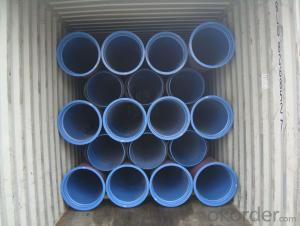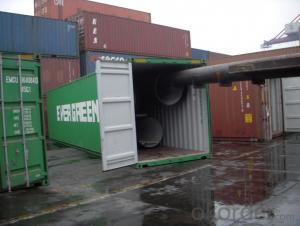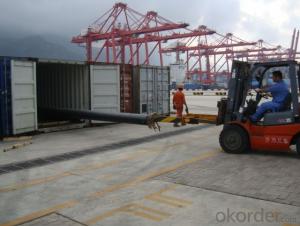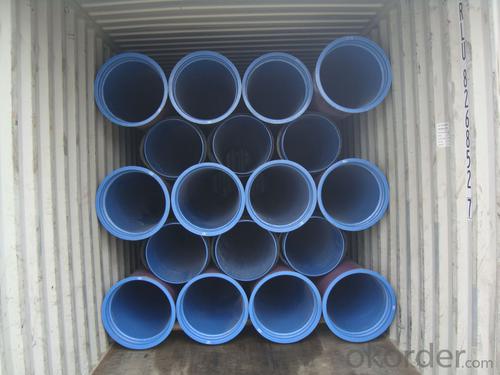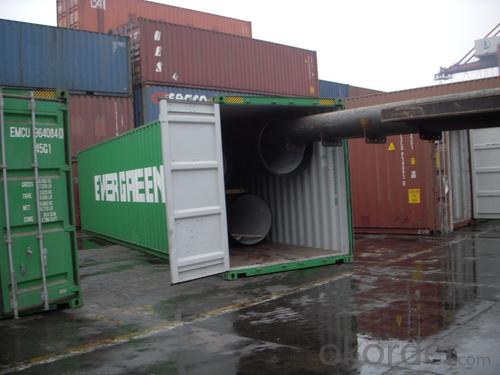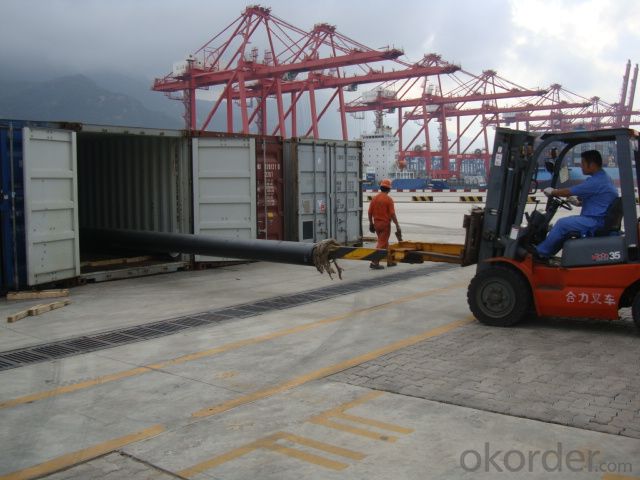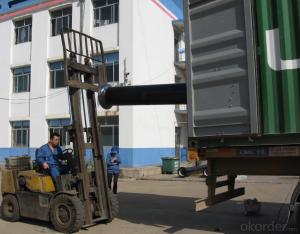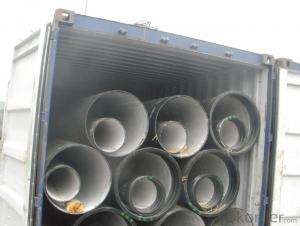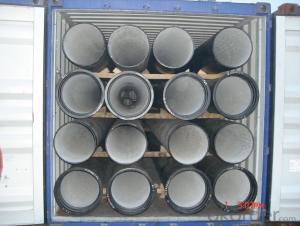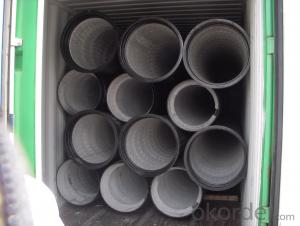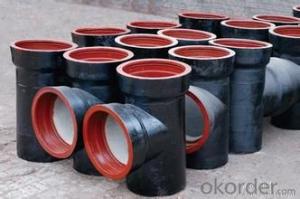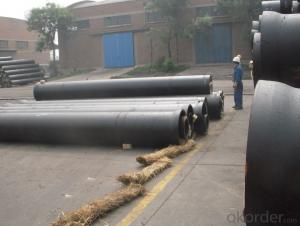DUCTILE IRON PIPES C Class DN1100
- Loading Port:
- China Main Port
- Payment Terms:
- TT OR LC
- Min Order Qty:
- -
- Supply Capability:
- -
OKorder Service Pledge
OKorder Financial Service
You Might Also Like
Ductile Iron Cast Pipe is without any defects compare with tradition casting tech, which has many advantages particularly as follow:
(1) High density. In the "vertical upward casting" process, the melt iron of centre liquid column in center crystallizer is continuously feeding for volume shrinkage caused by condensation tube at outer circumference , which lead to be free of shrinkage porosity.
(2) High purity. When melt iron pouring, the mixed impurities such as gas, dross, sand grain which are lighter than melt iron could be eliminated at furnace mouth, its impossible to enter into the crystallizer through the channel, so the melt iron into the crystallizer is very pure.
(3) Strength with toughness. The cooling speed provided by continuous crystallizer is 30 times than sand casting and 5 times than centrifugal casting, and doesn't produce white iron, the eutectic cell volume of continuous cast iron is one eighth to one tenth compare with traditional cast iron. The density of graphite nodule in ductile iron can reach 300-700 pcs/mm2. Therefore, all reason above improve the strength and toughness of continuous cast iron.
(4) Free machining. The high speed cooling make the hardening phase (such as boride, steadite) not appear like reticular, massive or thick, but diffuse like fish bone and pane in shape, moreover, there are tiny graphite flakes inlaid hardening phase. It's free machining in BrinellHardness the range of 250-300HB. However, the Brinell Hardness of 250 is top limit to common metal materials.
(5) Uniform composition of tube wall. The convection mixing of liquid column caused by marching type drawing in crystallizer make the composition of tube wall well-distributed, and concentration gradient very little.
(6) High productivity. To the wall thickness of tube under 10mm, the speed of continuous casting is 1 meter/min, to the wall thickness of tube under 20mm, the speed of continuous casting is 0.5 meter/min, which is high efficiency that centrifugal or other casting tech couldn't reach.
- Q: Can ductile iron pipe be repaired if it gets damaged?
- Yes, ductile iron pipe can be repaired if it gets damaged. Various repair methods such as welding, clamping, and epoxy lining can be used to fix cracks, leaks, or other types of damage in ductile iron pipes. However, the repair method depends on the nature and extent of the damage, and it is recommended to consult with experts or professionals for proper repair procedures.
- Q: How are ductile iron pipes installed?
- Typically, the installation of ductile iron pipes follows a specific process. Firstly, the required depth and width of the trench are excavated. Careful leveling and compaction of the trench's bottom then establish a stable foundation. Next, a bedding material, usually a mixture of sand and gravel, is placed at the trench's bottom. This material supports the pipe and distributes the load evenly, while also safeguarding it from any sharp objects in the soil. Once the bedding is prepared, the ductile iron pipes are gently lowered into the trench and aligned as desired. Proper alignment and the correct slope are essential for efficient water flow. Subsequently, the pipes are joined together using either a mechanical joint or a push-on joint system. These joints are designed to create a secure, leak-free connection between the pipes. Rubber gaskets are typically used to seal the joints and establish a watertight seal. After joining the pipes, the trench is backfilled with the excavated soil. Care is taken to compact the soil in layers to prevent settlement. The backfilling process is typically carried out in stages to ensure proper compaction. Lastly, the installation is completed by connecting the ductile iron pipes to the existing water supply system or other pipes using appropriate fittings and valves. Pressure testing may also be conducted to verify the installation's integrity. In conclusion, the installation of ductile iron pipes necessitates meticulous planning, precise alignment, and secure jointing to establish a durable and dependable water supply system.
- Q: Can ductile iron pipe be used for high-pressure gas systems?
- Ductile iron pipe is a viable option for high-pressure gas systems due to its remarkable strength and durability. Its ability to withstand high pressures makes it suitable for applications requiring such systems. It possesses outstanding mechanical properties, including high tensile strength, yield strength, and impact resistance. These properties enable it to endure the pressures associated with gas transmission. Additionally, its resistance to corrosion ensures its reliability for long-term use in high-pressure gas systems. However, to ensure optimal safety and performance, it is crucial to consider the specific requirements and regulations of the gas system and seek guidance from industry professionals for correct installation and maintenance of the ductile iron pipe.
- Q: Can ductile iron pipes be used for underground oil and gas pipelines?
- Underground oil and gas pipelines can utilize ductile iron pipes, which offer a robust and enduring material capable of withstanding the demanding characteristics of oil and gas transportation. With its exceptional tensile strength and impact resistance, ductile iron brings a high level of suitability for subterranean applications. Additionally, these pipes exhibit resistance against external loads, a crucial attribute for underground pipelines that might experience soil movements or heavy traffic. Moreover, the easy assembly of ductile iron pipes facilitates efficient installation and maintenance procedures. Nevertheless, it is crucial to carefully consider a range of factors, including soil conditions, environmental elements, and specific project prerequisites, prior to selecting ductile iron pipes for underground oil and gas pipelines.
- Q: Can ductile iron pipe be used for potable water systems?
- Yes, ductile iron pipe can be used for potable water systems. Ductile iron is a strong and durable material that is resistant to corrosion and can withstand high pressure and flow rates. It has been widely used in potable water systems for many years due to its reliability and longevity. However, it is important to ensure that the pipe is properly coated or lined to prevent any leaching of iron into the water.
- Q: Can ductile iron pipe be used for chemical processing plant applications?
- Yes, ductile iron pipe can be used for chemical processing plant applications. Ductile iron is a type of cast iron that has enhanced properties, such as improved ductility and strength, which make it suitable for a variety of industrial applications, including chemical processing plants. Ductile iron pipes have good corrosion resistance, can withstand high temperatures and pressures, and are able to handle aggressive chemical substances. Additionally, ductile iron pipes are easy to install and maintain, making them a cost-effective choice for chemical processing plants. However, it is important to consider the specific requirements and conditions of the chemical processing plant when selecting piping materials, and consult with experts to ensure that the chosen materials are suitable for the specific chemical processes and substances involved.
- Q: Are ductile iron pipes suitable for bridge piers or abutments?
- Yes, ductile iron pipes are suitable for bridge piers or abutments. Ductile iron is a strong and durable material that is widely used in various infrastructure projects, including bridges. It has excellent mechanical properties, including high tensile strength and impact resistance, making it capable of withstanding heavy loads and external forces. Additionally, ductile iron pipes are highly resistant to corrosion and have a long service life, which is crucial for structures like bridge piers or abutments that are exposed to harsh environmental conditions. The versatility and reliability of ductile iron pipes make them a suitable choice for supporting and reinforcing bridge structures, ensuring their safety and longevity.
- Q: Will nodular cast iron pipes rust?
- Qualified ductile iron pipe requires lining standard cement. The outer wall of pipe needs spraying zinc treatment and asphalt paint coating, and other epoxy resin paint can also be selected. Qualified ductile iron pipes can be used for more than a hundred years. The main place where rust is easily exposed is where the outer wall meets the soil because of its high humidity and high oxygen content. Qualified anticorrosion can effectively resist rust, its process principle can not give you the details.
- Q: Are ductile iron pipes suitable for gravity flow applications?
- Yes, ductile iron pipes are suitable for gravity flow applications. Ductile iron pipes have high strength and durability, making them ideal for carrying fluids under gravity. They can withstand the pressure and weight of fluid flow without the need for additional support or reinforcement. Additionally, ductile iron pipes have excellent corrosion resistance, which ensures their long-term performance in gravity flow systems.
- Q: Do ductile iron pipes require special maintenance?
- Yes, ductile iron pipes do require special maintenance. While ductile iron is known for its strength and durability, it is still susceptible to certain forms of corrosion. Regular maintenance is necessary to prevent corrosion and prolong the lifespan of the pipes. This maintenance typically includes periodic inspections to check for any signs of corrosion or damage, as well as cleaning and protective coating applications. Additionally, proper handling and installation techniques should be followed to ensure the integrity of the pipes. Regular maintenance and adherence to industry best practices can help prevent leaks, breaks, and other issues, ultimately saving time and money in the long run.
Send your message to us
DUCTILE IRON PIPES C Class DN1100
- Loading Port:
- China Main Port
- Payment Terms:
- TT OR LC
- Min Order Qty:
- -
- Supply Capability:
- -
OKorder Service Pledge
OKorder Financial Service
Similar products
Hot products
Hot Searches
Related keywords
